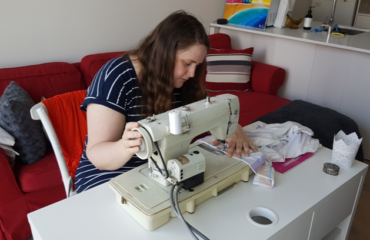‘UNDERSTANDING the reality of living while dying is a big part of my job as an occupational therapist in palliative care. My PhD explored the everyday experiences of ten people with advanced cancer nearing the end of their lives. It gave me the opportunity to step away from my clinical role and reflect on the culture of palliative care.
Occupational therapists help patients regain as much independence as possible during the last months and weeks of their lives. Now that people are dying slower than they have historically, we have to change the way we engage with living and dying and how we perceive palliative care.
I started work in the field about 13 years ago. Initially, although I liked it, I found the constant confrontation with death and mortality depressing. So I decided to do some postgraduate study because when I trained as an occupational therapist there was almost no palliative care instruction.
As part of my research I interviewed ten people with progressive functional decline due to advanced cancer. I spoke to many people within two to four weeks of their death. I wanted to gain an understanding of their everyday experiences of decline at the end of life.

What my thesis challenges is the palliative care culture of “TLC-ing” people to death. At the end of the thesis I arrived at the simple question: “what for? Why do we allow people to live longer?” They don’t want to just lie in bed. Living and dying are intertwined and death is just the last bit at the end; there’s a lot of living that people want to do in between.
Even in the last weeks of their lives the participants in my study still wanted to be doing things important to them. I’ll never forget when my oldest participant, aged 95, dropped to the ground and did sit-ups to prove his physical control. He really struggled because his wife thought he would die faster if he was doing things and she would tell him off for being active.
It’s about being actively engaged in the process of living and dying. Living while dying is not simple. There is a profound disconnect between mind and body. Adapting to changes involves trial and error and people must fail to know their limits. People need to be encouraged and supported to do as much for themselves as possible to retain dignity at the end of life.
One of the simplest and most profound things I gained from my thesis was the importance of asking the right questions. These are questions that give people the opportunity to articulate their experiences as best they can at the end of life. We have to be overt and actually ask questions like: “what’s important for you right now?” or “what’s that – e.g. leg weakness – like for you?”
In health we often don’t ask these questions. The focus is on getting people better. People receiving palliative care do not get better in the long term but they still want quality of life. We need to build real understanding in order to encourage life in the face of death in creative ways.
My PhD gave an added depth and validity to my occupation and many opportunities have emerged since. The importance of palliative care is becoming increasingly recognised and I see my role changing. I am now chairing the Allied Health in Palliative Care Australia group – we are looking to improve research and educate people about what palliative care offers people at the end of their lives.’
* TLC: tender loving care
Deidre Morgan completed her PhD last year. Her thesis was titled: ‘The ordinary becomes extraordinary: the occupation of living whilst dying’.
* “My PhD” is an irregular series in which The Citizen speaks with recent Melbourne University PhD graduates.

